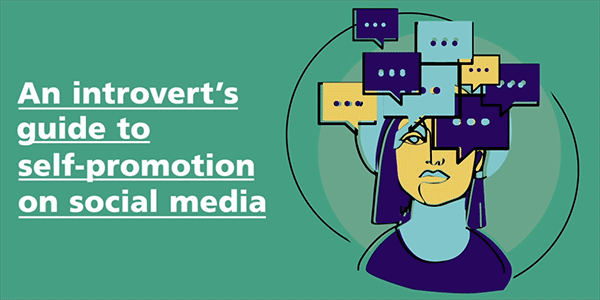An introvert’s guide to self-promotion on social media

This article was written by freelancer Rachel Michaella Finn
We’re all aware by now that being on social media can be an important part of any career, from finding a new job, to keeping colleagues or clients aware of what you’re up to when you have one. And if you’re self-employed, or ever plan to be, then having a good social media presence is how you’ll advertise your work and get more clients, so getting a basic grasp on self-promotion has never been more important. 2018 analysis by Consultancy.uk suggests there are now 5 million such people in the UK – that’s 15% of the workforce! – and it’s a number that seems only set to rise.
But if you draw most of your energy from working alone, feel drained after too much socialising and are perfectly happy alone with your own thoughts, you might be an introvert and find the process of opening up on a public platform about your work strange or a little bit daunting. It can be easy to over-think what you’re posting or to worry if anyone will really care, but ultimately you’ll gain more from making sure to post than not.
Here’s how to keep your worries about posting to social media at bay and use it to your advantage.
Choose the right platform
First off, it’s important to pick the right kind of platform for the work you’re doing. Although many people have accounts on multiple platforms, some are more relevant to particular industries or particular kinds of work. Don’t waste time posting on a platform that won’t add anything to your life or career.
For example, if you’re working in a visual medium like photography or graphic design, it’s obvious that your work will probably be better received on Instagram than a text-led platform like Twitter. If you’re selling a product of any kind, Pinterest is a vital platform to be on, as 90% of users say they use the platform to help them decide what to buy, according to Shopify. If your work is writing-based, it’s going to be more beneficial to promote your work on Twitter as opposed to Instagram, even if a presence on both could be useful.
It’s also useful to think about what demographic you’d like your work to be promoted to as well. More than half of users on Instagram are 34 or younger, according to Statistica, whereas Facebook has an age range of users that tends to skew a bit older.
Doing some research and thinking about which platform is best for you will save you time in the long-run as you’ll know where is best to focus your efforts and will be able to cut out any posting that you don’t really need.
Seek out a personal brand that’s authentic
If you don’t naturally love posting to social media, it can be tempting to feel like you have to fulfil a loud, extroverted personal brand that doesn’t necessarily feel super authentic in order to get work, but that isn’t necessarily true. Making sure to post regular, relevant posts about your your interests or industry will likely connect better with your audience (and potential future employers!) than firing off any random thought you have.
A good way to do this is to think about who you are IRL and then think about how you could translate this into your online profile. What are the strongest parts of your personality? What’s a topic that you’re passionate about in your work? What are your interests? Translating this into your online presence could be as simple as making sure you’re sharing an article about your industry that you found interesting once a week or tweeting your thoughts about something that’s recently happened in your field. Commit to it and try not to filter yourself too much – authenticity will connect far better than trying to be someone you’re not.
Schedule your posts in advance
However you decide to build your brand, one of the most important things is to be consistent. Active profiles are more likely to have more followers and more engagement, which in turn can lead to more opportunities. But if you don’t naturally feel the need to post your thoughts to social media without thinking about it, creating a social media schedule and scheduling things in advance can be useful to make sure you’re not going weeks without posting anything, as well as allowing you to bypass that tense moment where you press ‘post’ and your post goes live immediately. It also gives you some buffer time – if you schedule something and change your mind before it goes live, you can just delete it. Tweetdeck and Buffer are simple-to-use scheduling systems which will let you schedule all your posts in one go, so you can get back to the real work that you actually care about the most.
Seek out meaningful interactions
It’s one thing making sure to post to your profiles, but it’s important as well to, well, be social on social media. Doing this part is actually quite simple – follow people in your industry that you admire, see who they’re following in order to get ideas of who you should follow next and then comment on their posts regularly and make sure to be part of the discussion. It’s easy to slip into being just an observer online, but a little push to get involved in discussions can go a long way. Many people look to their social media networks when looking to hire someone for a new job or project, so make sure you’re scheduling time – even just ten minutes a day – to interact with others online.
Rationalise your worries
A big one for many of us is the fear that what we’re posting won’t be relevant/interesting/funny enough or that we don’t get enough likes or have enough of a following for an active social media presence to be relevant. But, really, when you think about it, that isn’t true. Posting regularly is how people tend to get a wider following in the first place and it’s likely that no-one out there is paying as much attention to what you’re posting as you are yourself as, let’s be real, people are generally just too interested in their own lives to care if your post got enough likes or not. Ask yourself ‘why am I posting this?’ before you post and if you think you have a good enough answer before you post, just go ahead and move on. There are bigger things to worry about in the world anyway, right?
